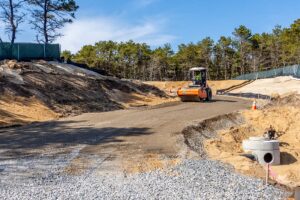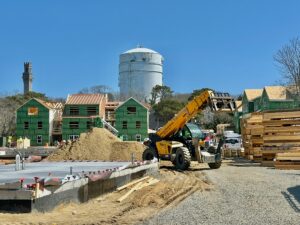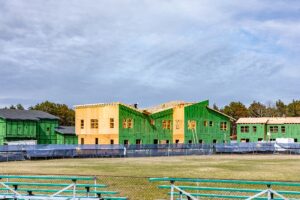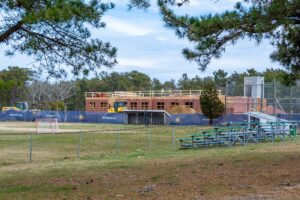TRURO — At a groundbreaking ceremony for the 43-unit Cloverleaf affordable housing project on April 11, the mood was equal parts festive and frustrated. Construction is expected to be complete by February 2027, according to project developer Ted Malone — but plans to build affordable rentals on the surplus state land date all the way back to a town meeting vote in 2016 and a visit to Truro by then-Lt. Gov. Kathryn Polito in 2015.

“By the time construction is complete and the first occupants move in, this project is likely to have been 12 years in the making,” said Town Moderator Paul Wisotzky, who also serves on the Truro Housing Authority.
“As we celebrate today, let’s also recommit to our efforts to create more affordable and attainable housing now — not housing that takes 10 years to create,” Wisotzky said.
“We can’t pretend that everything is fine,” said state Sen. Julian Cyr at the ceremony. “A parent just told me that their child’s class at Truro Central School is dropping from six kids to five. When I went to that school there were 25 kids in our grade.”

Cyr cited U.S. Census data showing that Truro’s median age had risen from 45.7 years in 2000 to 66.2 years in 2023 and that the cost of housing far outstrips incomes earned by people who work here.
“This inequity is homegrown — it lives right here — but we are making headway,” Cyr said, citing the potential for housing at the Walsh property. “There is room here — there must be — so let’s resolve ourselves that it’s not going to take another 12 years.”
Three Projects Underway
The 3.9-acre Cloverleaf project — named for the four-lobed highway exit that the land had originally been set aside for — is one of three affordable rental housing projects currently under construction on the Outer Cape.

A 46-unit project on town-owned land at 95 Lawrence Road in Wellfleet is expected to be complete around February 2026, and a 65-unit project at 3 Jerome Smith Road in Provincetown should be finished around May 2026, according to the developers of those projects.
Interested households will be able to submit applications about six months before the expected completion date, which means the lottery for the Wellfleet apartments could take place this December, followed by a lottery in Provincetown early next spring.
The 3 Jerome Smith Road project, named “Province Post” after the VFW hall that formerly occupied the site, has also had a long timeline. The land was sold to the town in 2013, but the parcel was ensnared in the town’s long-running debate over the size and location of a new police station, and a formal “request for proposals” (RFP) to select a project developer was not issued until 2021.

The timeline at 95 Lawrence Road has not been quite as long — just under six years from the beginning of work on the RFP to opening day, said Jay Coburn, CEO of the Community Development Partnership.
The 12-year timeline at the Cloverleaf had several causes, including a dramatic rise in construction costs after the pandemic that required new sources of financing. But it also took nearly two years to secure a comprehensive permit from the zoning board of appeals under the state’s 40B law, and another year was lost to a lawsuit from people who objected to the project, said Malone.
“We missed three state funding cycles,” said Malone. “And the initial plaintiffs were not abutters — one abutter was brought into the lawsuit after the fact just to give them standing in court.”
A 16-unit affordable housing project at Sally’s Way in Truro was held up for five years by a lawsuit from a single neighbor, Malone said. Almost 13 years passed between the conception of that project and its opening day in 2011.
“The opponents of affordable housing use a playbook — delay, delay, delay,” said Malone. “Make it cost too much money and get people to roll up their plans and go somewhere else.”
Avoiding Pitfalls
As leaders here look to the next three major projects — the 21-acre Maurice’s Campground site in Wellfleet, the 70-acre Walsh property in Truro, and the 11-acre T-Time site in Eastham — they are hoping to avoid some of the pitfalls that delayed the Cloverleaf project.

With Maurice’s, which the town purchased in 2022, voters will decide on $125,000 to fund the writing of an RFP at town meeting on April 28. If the project were to follow a timeline similar to the 95 Lawrence Road project, that would place move-in day for new residents almost six years in the future — in early 2031.
“Wellfleet has done a good job of putting together a master plan and moving it forward,” said Coburn. Given how long the entire development process can take, “the town should be thinking about what’s next in terms of land for purchase — there should be discussions now about what parcels might be available.”
In Truro, a Walsh overlay zoning district is on the May 3 town meeting warrant. In addition to mapping where housing would be allowed on the 70-acre Walsh property and prescribing design standards, the overlay district would make multi-family housing and mixed-use commercial-and-residential buildings legal by right in the 33-acre “moderate density subdistrict.”
There are fewer contestable permits from planning and zoning boards in a by-right project, said Laura Shufelt, an affordable housing expert at the Mass Housing Partnership. Zoning for multi-family housing helps speed up development timelines and keep projects out of court, she said.
“Everything is appealable, but it’s more difficult if a project is allowed by right,” Shufelt said.

It’s also easier to attract a wide range of developers when multi-family zoning is in place, Shufelt said. Without it, affordable housing developers need to use the state’s 40B process, which has complex financial requirements that deter many potential builders, Malone said.
Truro Town Planner and Land Use Counsel Barbara Carboni said, “There are a million reasons to do a zoning overlay district — including better planning and an outcome more consistent with the town’s vision.”
If developers stick to the overlay district’s new use table and other provisions, they wouldn’t need a permit from the planning board or zoning board of appeals, Carboni said. There would still be board of health and state Dept. of Environmental Protection oversight of the wastewater system that would serve the Walsh property and Truro Central School.
The state has also changed the rules for abutter lawsuits, Malone and Shufelt pointed out. The Housing Choice Act of 2020 allowed judges to assess up to a $50,000 bond on plaintiffs who appeal town-issued permits — and the Affordable Homes Act of 2024 increased that amount to $250,000. The law also tightened the rules on who can file such suits and what they must prove.
“Thanks to the Affordable Homes Act, these spurious lawsuits should come to a halt, and the next Cloverleaf won’t take 11 years,” said Cyr. “Massachusetts can’t afford delay tactics when families need homes now.”
Eastham will also be voting on new multi-family zoning for the North Eastham Business District at town meeting on May 5 — an area that includes the town-owned T-Time and Town Center Plaza parcels. Major housing projects on those parcels are still years away, Coburn said, because “they’re going to sewer parts of North Eastham, and it really does make more sense to wait.”
That’s why limiting the special permit process with zoning and limiting abutter appeals with new laws are joined, in Coburn’s view, by a third strategy.
“There are other parcels in Eastham,” Coburn said. “Given how long it takes, and that we need this housing, we need to be doing multiple projects in each of these towns to meet these goals.”



